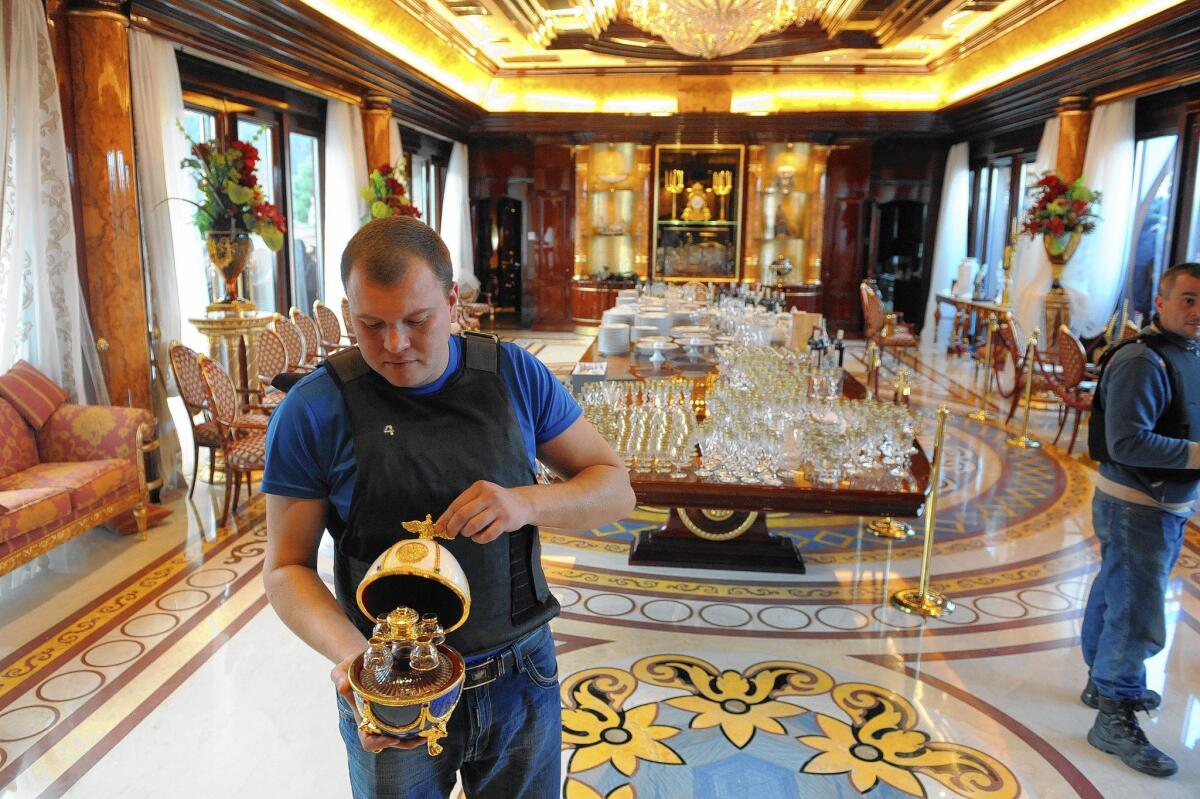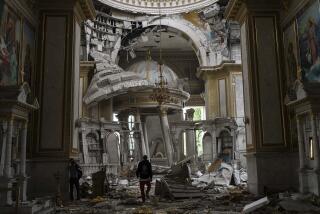Great Read: Ex-leader’s estate embodies Ukraine’s past, present, hope for future

On a summer’s day in the park, children gripped Frisbees and ice cream cones as they tottered next to distracted parents. A wedding party simulated a conga line for a patient cameraman. A trio of twentysomething men sipped kvass, a favorite only-looks-like-beer beverage.
Framing the children and their scoops of vanilla and raspberry was a massive structure that looked as if the Parthenon had somehow been transported to a French royal estate, married a Russian dacha and then had a country-cozy Martha Stewart house fall on its head.
The weekend revelers had, apparently, wandered into a billionaire’s fever dream.
And it got even more surreal.
Just yards from where the children ran and posed next to zoo animals in the seaside estate, Ukrainian soldiers often could be seen jogging and training in their uniforms. Not far away, a woman in a worn tracksuit trudged along, her face suggesting the trauma of the life she fled as a refugee from the country’s war in the east.
In another corner of the grounds, a young man grimaced in a cafeteria kitchen, bullet wounds pocking his leg and evidence of police-truncheon blows splotched across his shoulders.
This is Mezhyhirya, the estate of deposed Ukrainian President Viktor Yanukovich. For years, the sprawling compound — with its waterfalls, hunting grounds, ornate buildings and even a car museum — epitomized to tens of millions of Ukrainians the leader’s excesses.
But six months after Yanukovich was ousted after a series of bloody protests, the estate has become a post-revolution melting pot, embodying at once a country’s dysfunctional past, confused present and tentative hopes for the future.
“I look around here and it reminds me of all Yanukovich did to ruin the lives of Ukrainians for so many years, and it gets me really angry,” said Leonid Bibik, the wounded man from the cafeteria kitchen. “Then I look at all the people who are here now, and it makes me feel better.”
A fighter on the front lines of the protests, he drove a Bobcat military carrier directly at riot police in the revolution’s early stages. The image quickly went viral and galvanized many of the protesters.
Bibik wanted to join soldiers in Ukraine’s current conflict against pro-Russia insurgents in the east, but his wounds rendered him ineligible for combat. He came here instead, cooking for dozens of refugees from that war.
“If I can’t protect them, at least I can feed them,” he said.
At a building nearby, a man with an iPhone magnetized to his ear was coordinating the plans of some of the refugees.
“I need to know exactly when this new group will be here,” said the man, known as Commandant Denys, who has assumed the role of running Mezhyhirya as it remains in legal limbo.
Asked about the irony of the refugees living amid the indulgences of a Moscow-backed leader who in many ways is responsible for their predicament, the commandant replied: “After everything they’ve been through, they deserve to have a little of what Yanukovich had.”
::
Yanukovich left office the way a Hemingway character went broke: gradually at first, and then suddenly.
Years of alleged corruption, a sinking economy and suppression of dissent resulted in a powder keg of protests at Kiev’s central square last winter. At those rallies, protesters chanted about Yanukovich’s abuses, often citing Mezhyhirya as shorthand for them. After hundreds of protesters were killed or went missing, Yanukovich fled in February, leaving behind his real-estate jewel about 45 minutes outside the capital.
The government quickly moved to nationalize the complex, and an official transfer to state ownership happened at the end of June. But its fate is a source of much argument.
Many Ukrainians have claimed it as a much-needed park, making repeat visits here on the weekend to bicycle and picnic.
The commandant (full name: Denys Tarakhkotelyk) is a civic leader from the revolution who took it upon himself to turn part of it into a home for refugees from the war in the east.
The country’s prosecutor general, on the other hand, recently filed a motion to close the place, saying it was essentially a crime scene and would need to be sealed to gather evidence for proceedings against Yanukovich.
The agricultural minister, meanwhile, has claimed it should come under his jurisdiction — though he’s yet to say for what purpose.
There has even been a grass-roots movement to sell the compound and use the proceeds to finance the war effort. Wouldn’t that be the best rebuttal, advocates of this plan say, to a president with his own unsettling ties to Moscow?
“A park, definitely a park, where people can come with their families,” Mischa Bogdan, 22, one of the kvass-drinkers, said as he stood in front of the car museum. He had traveled several hours with friends from his hometown on a recent Saturday to see it, and was now debating with them how it should be used.
“But if there are refugees, they should live there too,” said one of his friends, Ivan Ponaida, 23.
Though they keep a low profile, some of the displaced can occasionally be seen with dogs or other possessions they brought with them. They are understandably reluctant to speak.
“The refugees realize how strange it is that they’re in Mezhyhirya,” said Oldrich Andrysek, Ukraine’s representative for the U.N. High Commissioner for Refugees. “They’ve never seen anything like it. I’ve never seen anything like it.”
The refugees’ needs are overseen out of a makeshift headquarters in a guesthouse that sits on one of several of the estate’s canals. Anywhere else this would be considered a well-to-do home; here it seems modest. During the Yanukovich era Russian President Vladimir Putin would stay there on his trips into town to meet with his Ukrainian ally.
“But only for a few hours, to take a nap, not to stay there for the night. I mean, it is Vladimir Putin,” said Bibik, as though to facetiously suggest the Russian leader wouldn’t deign to retire for the evening in anything less than a sprawling mansion.
About a quarter of a mile down a long, impeccably paved roadway — the surest sign, locals say, that this whole place was clearly not for them — sits one of several zoos. In one of them, visitors lingered behind a fence containing a number of wandering goats, the animals’ bleating loud and unmistakable.
“Yanukovich supporters,” said one visitor.
::
At the heart of Mezhyhirya lies a fundamental question: Should a formerly oppressed people look to remember, raze or redefine the symbols of their oppression? How people answer that question may say as much about them as it does the compound, real estate as Rorschach test.
There is a sense among some Ukrainians that, as much as they may dislike what Mezhyhirya represents, they respect what someone from their country was able to attain.
At one end of the waterfront property, Yanukovich had put a gleaming boat that wouldn’t have been out of place on the set of “Lost” — a docked structure that suggests the promise of great journeys but in fact goes nowhere. An older woman peered through its window at the high-end china inside and said, admiringly and with perhaps unintentional symbolism, “It looks like something you’d see on the Titanic.”
Others see Mezhyhirya as a tool to make a political point.
As he sat on a shady rock with his teenage daughter, Rostyslav Kisili, 49, said he wanted the place to become a museum, a retort to those who would deny the faults of its previous occupant.
“My father-in-law believes all the Russian propaganda that Yanukovich wasn’t so bad and that he was framed by America and Europe,” Kisili said. “If he saw this place, he’d know who Yanukovich really was.”
He added ruefully. “I’m still not sure he’d believe it.”
If it were up to Kisili, there would be markers and explainers throughout the grounds — memorials for fallen dissidents, history lessons of what enabled Yanukovich to maintain power, context for how a leader was able to spend millions of dollars on so many extravagances while his people suffered.
But some simply think that maintaining this site as a leafy respite is its own kind of statement. They say that the wedding photo shoots and other activities, by their very ordinariness, are not a sign of disrespect for the abuses but a neutralization of them.
Kateryna and Volodomyr, husband-and-wife psychoanalysts from Kiev who declined to offer last names because of the fraught nature of the debate, paused as they pedaled up a steep hill.
“If we, regular people from Kiev, are biking and it’s beautiful here and we’re having a nice weekend,” Kateryna said, “isn’t that the best response to Yanukovich?”
More to Read
Start your day right
Sign up for Essential California for news, features and recommendations from the L.A. Times and beyond in your inbox six days a week.
You may occasionally receive promotional content from the Los Angeles Times.







